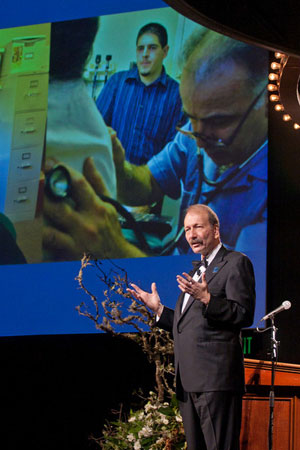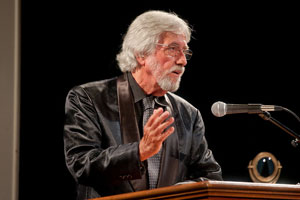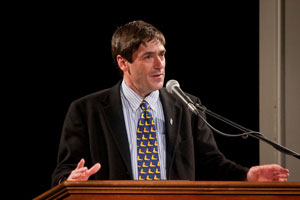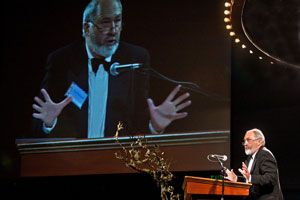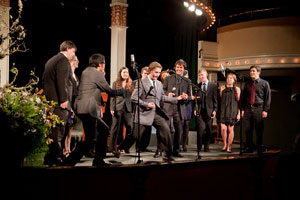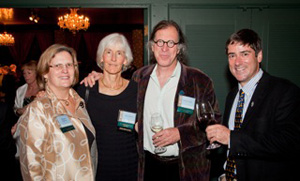The fourth annual UC Santa Cruz Founders Day Dinner drew 375 people to the Cocoanut Grove on Friday night to celebrate the accomplishments of an environmentalist/explorer, an NPR science correspondent, a theater arts professor, and a charitable foundation that helped start the campus.
Sold out for weeks in advance, the black-tie-optional event was a chance to mingle with educators, faculty, civic leaders, philanthropists, entrepreneurs, pioneer alumni, donors, artists, and journalists while celebrating the founding principles of UC Santa Cruz and recognizing outstanding achievement.
Honored at the event were:
• Foundation Medal: Jean-Michel Cousteau
• Fiat Lux Award: S. H. Cowell Foundation
• Alumni Achievement Award: Richard Harris
• Faculty Research Lecturer: Paul Whitworth
Multimedia presentations added to the event, which carried a "Decades of Discovery" theme. Cousteau received the Foundation Medal after an oversized screen showed images of rainbow-colored fish, and piles of ocean trash, illustrating the marine life he is trying to save and the challenges he faces.
Cousteau briefly mentioned one of his biggest triumphs--screening his documentary film, Voyage to Kure, for then-President George W. Bush, showing the president the environmental devastation taking place in the waters off the northwestern Hawaiian islands, and helping to convince him to name 40,000 square miles of ocean, and 10 islands, as part of the Northwestern Hawaiian Islands Marine National Monument.
"This is an emotional moment because it happens to be my father's hundredth birthday," he said, referring to his famous father, ocean explorer Jacques-Yves Cousteau. "I'm sure my parents are listening somewhere, maybe down in the kelp bed out there," he added.
Richard Harris, wearing a banana slug tie, took to the stage to accept his UCSC Alumni Association Award after a brief video showed some of his career highlights as a science journalist, including his travels to China to report on the SARS epidemic and his investigative stories about climate change.
"He's the most effective ambassador for our [science communication] program that I can imagine," said John Wilkes, who founded the program and served as its longtime director before retiring in 2006.
A biographical video showed Faculty Research Lecturer award winner and former Shakespeare Santa Cruz director Paul Whitworth as a young lion in the acting world. Whitworth, during his brief remarks, was self-effacing and candid about the journey that took him to UCSC.
"There were lots of things I passionately wanted to be," he said. "Deep-sea diver, Elvis Presley, Achilles, Picasso, and more recently, Lady Gaga."
Fortunately, Whitworth said, he had mentors who steered him toward being a performer, researcher, and professor.
UCSC also recognized the S. H. Cowell Foundation with the Fiat Lux Award, in honor of the foundation's $4 million in gifts to UC Santa Cruz over the past 45 years, and in response to Cowell's role in jump-starting UCSC.
The campus sits squarely on what was once Cowell Ranch. The foundation also contributed to the construction and naming of UCSC's first college and the Cowell Student Health Center.
In the brief video about the foundation, emeritus vice chancellor Harold "Hal" Hyde said the Cowell family, including rancher and landholder Henry Cowell, who died almost a century ago, would have been "amused and amazed" to see UCSC's continuing stewardship of the former ranch.
"They had a reverential feeling for the land," he said.
In his opening remarks, Chancellor George Blumenthal said the event was a chance to honor UCSC's history, celebrate its present, and get a glimpse of its future.
"Since I've been chancellor, I still hear things like 'You're the city on the hill, full of protesters--and they don't even get graded!'" Blumenthal said. "Let me tell you something. In academia, reputation lags behind reality by about a decade. When I got here in 1972, people would ask me, "Is there really science at UCSC?"'
In response to this query, Blumenthal, a distinguished professor of astronomy and astrophysics, talked about UCSC getting ranked 68th out of all the world's universities according to the Times of London, UCSC scientists assembling the finished human genome sequence, the widespread use of the UCSC Cancer Genomics Browser, and the development of an HIV vaccine.
These days, he said, the question has changed to "Is there humanities at UCSC"?
"The answer is, 'yes'--and more," he responded.
In closing, he mentioned that today's students do, in fact, receive grades.
